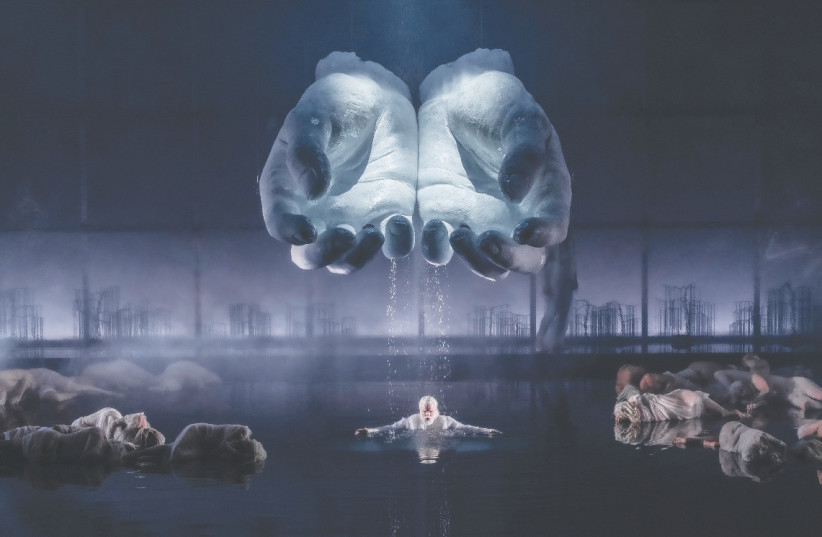Considered one of the greatest achievements of Czech composer Antonín Dvorák, the opera Rusalka, about the love between a human prince (tenor Alexei Dolgov) and a mermaid (soprano Alla Vasilevitsky), opens at the Israeli Opera next week.
Returning to the director’s chair is Stefano Poda, who oversees nearly all aspects of this complex fairy tale, from the choreography of the dancers to the exact shade of makeup applied to baritone Ionut Pascu in his role as Vodnik, Rusalka’s father.
His match for this production, overseeing the musical aspects, is conductor Dan Ettinger.
“Four decades ago, most conductors enjoyed a great degree of artistic freedom,” Ettinger told The Jerusalem Post. Over time, the focus shifted from the role of the conductor to that of the director, with movie and theater directors of note being invited to direct operas. These include head of the Performing Arts School at Kibbutzim College Yehezkel Lazarov, who will stage the upcoming April production of Orfeo ed Euridice by Gluck at the Israeli Opera, and theater director Krzysztof Warlikowski, who recently directed Verdi’s Macbeth, as reviewed in the Post by Irving Spitz.
While enriching the opera world, not all directors are easygoing when it comes to staging their vision. This is why it is a delight when a director like Poda trusts the conductor to give the music its due.

“He crafted for this production of Rusalka a watery cosmos that sucks us in,” Ettinger said. “Because this is not a realistic production, I was given a great deal of freedom when dealing with the partituras.” Pointing to the original Czech edition, Ettinger added that “we went over various partitutras from different productions to distill the finest expression of this watery opera.”
Opera sung in Czech
One of the handful of operas sung in a language other than Italian, German, or French – some noted others are Béla Bartók’s Hungarian opera Bluebeard’s Castle and the Russian opera A Life for the Tsar by Mikhail Glinka – Dvorák’s retelling of Rusalka as a powerful Czech opera was one of his greatest achievements.
While technically a mermaid, Rusalka belongs to a Slavic civilization in dialog with other cultures around it. The belief in water spirits was widespread among the Slavic people and, during the slow introduction of Christianity, their day of worship was merged with that of the Pentecost, or Rosalia, in Latin. This is the source of the heroine’s name. It is Rusalka’s father, Vodnik, who’s name maintains the old Slavic root word for water (Woda). This mythic creature, usually more sinister than shown here, inspired Dvorák to compose an earlier work named after it (Op.107).
The depiction of Vodnik as a loving father, pained by his daughter’s decision to give up her voice to become a human by conducting a trade with the witch-woman Ježibaba (mezzo-soprano Edna Prochnick), is rather warm. It is also one of the few operas in which the diva rarely sings because, after the deal is struck, she is mute. When Rusalka still possesses her mythical aspect as a water spirit, the audience is made aware of it by hearing the sound of a harp playing.
“A harp arpeggio,” or broken cord, “suggests a watery element,” Ettinger pointed out. “This is very much a harp opera, as for much of its telling, it is taking place underwater.’’ Water is also an important element of the stage design for this production, with performers leaping into pools and water falling onto the stage.
The mute Rusalka is able to capture the heart of the prince, but he frowns over her lack of warmth and social grace. Rejected, she returns to her father’s realm to become a much more sinister aspect – a Bludicka (will-o-the-wisp) – which murders those who love her with a kiss. Will the prince be able to repair the damage and keep his love human, or will she morph into a murderous spirit?
Antonín Dvorák’s Rusalka will premiere at the Israeli Opera on Monday, March 4, at 7:30 p.m. Performances will be held from Tuesday, March 5, to Thursday, March 14, at 8 p.m. daily – except for the two Friday performances on March 8, and 15, which will be given at 1 p.m. Sung in Czech with Hebrew and English titles. NIS 195-405 per ticket. Call (03) 692-7777 for bookings. The Israeli Opera, 19 Shaul Hamelech St., Tel Aviv.
